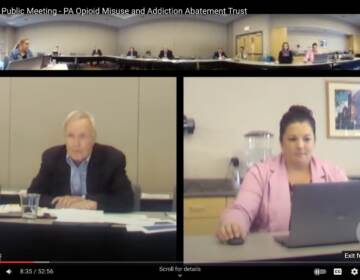With move to expand open-records law pending, most Pa. agencies get few requests
A new study shows that Pennsylvania's Right-to-Know law does not burden public agencies. Still, advocates for the public's right to know say there is room for improvement.

Erik Arneson, director of the Pennsylvania Office of Open Records. (Mary Wilson/WHYY, file)
The president tried to block a book’s publication. Philadelphia’s district attorney caught criticism for the secrecy surrounding controversial staff changes. New Jersey authorities banned a best-selling book on mass incarceration in two state prisons, prompting the state’s American Civil Liberties Union to intervene. And two Philly journalists recently had to sue to force city officials to release public records on jurors.
You don’t have to look long to find examples of government officials trying to hide facts from the public.
But for anyone disheartened by the trampling of transparency, Erik Arneson has some good news: Pennsylvania’s open-records law is working well, helping thousands of citizens access information that enables them to learn more about their government officials — and hold them accountable.
Arneson heads the state’s Office of Open Records, which recently polled about 1,300 public agencies (of about 5,000 state and local agencies statewide) about their experiences responding to requests filed under Pennsylvania’s Right-to-Know Law.
Arneson found that 87 percent of the agencies received one RTK request — or none at all — weekly in 2016, and 92 percent of agencies spent under five hours a week responding to them.
Most responses are not appealed, which a records requester must do in writing within 15 business days of a denial. Still, Arneson estimated that about 15,000 appeals have been filed since the law took effect in 2009.
“Overall, the law has worked exactly as we hoped, which is to say that a lot more government records are getting into the hands of the residents of Pennsylvania to hold their government accountable and to review the actions of their government,” Arneson said, adding that the survey results show “that the law is not being a burden for the vast majority of government agencies.”
Still, no law is perfect.
Melissa Melewsky, media law counsel with the Pennsylvania NewsMedia Association, points to the law’s exemptions for civil and criminal investigations as ripe for reform.
“Those two exemptions in the law are some of the broadest in the nation,” Melewsky said. “They contain no temporal limits. And citizens struggle for access to anything that has been termed investigatory under Pennsylvania law. We have no rights to access the results of any investigation, despite it being paid for with public funds and conducted for the public benefit.”
Melewsky added: “If the public can’t have access, they can’t hold their elected officials accountable for the decisions that they make, and that’s a big problem. Government works better when there’s an actively involved, informed citizenry.”
One lawmaker aims to improve public disclosure.
State Sen. John Blake, D-Lackawanna, has introduced a bill that would expand the RTK law to cover the four state-related universities (Temple, Lincoln, Penn State, and Pitt) and government-affiliated economic and industrial development authorities; to require public agencies to keep records of closed sessions; to retain all RTK records until a request is resolved; to allow agencies to charge fees for commercial requests; and to limit inmates’ right to file RTK requests for records about themselves and their incarceration (about 40 percent of all RTK appeals are filed by inmates).
The bill would not expand access to investigative records, beyond specifying that noncriminal final safety inspection reports should be public.
Some complain the current law is toothless because it carries no financial penalties for noncompliance. Blake’s bill would impose a $500-a-day fine on agencies and officials who flout the law.
The bill remains in the State Government committee.
WHYY is your source for fact-based, in-depth journalism and information. As a nonprofit organization, we rely on financial support from readers like you. Please give today.




